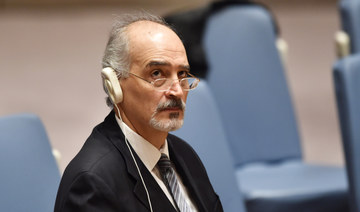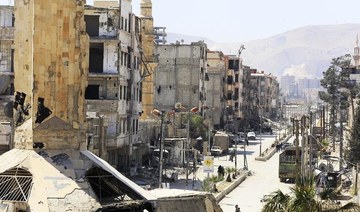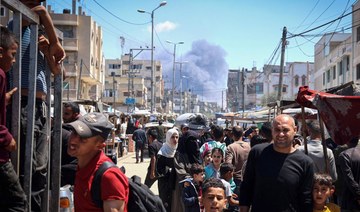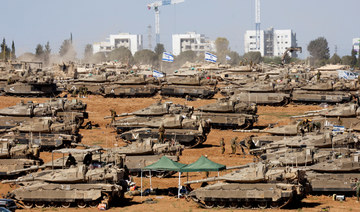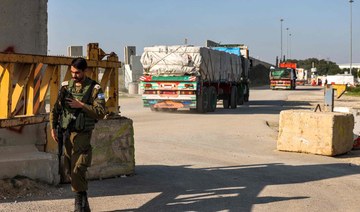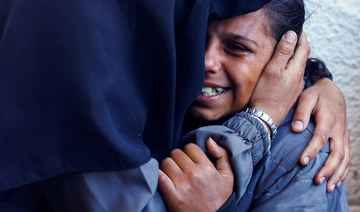NEW YORK: The victims of chemical-weapon attacks in Syria were barely mentioned during a UN Security Council meeting on Wednesday to discuss the Assad regime’s failure to comply with a resolution ordering the destruction of all such weapons.
As those victims were relegated to the sidelines, member states engaged in another, all-too familiar round of in-fighting as they traded accusations and vilified each other.
This was the 88th time the Security Council had gathered to discuss the issue of chemical weapons in Syria. Members were briefed by Izumi Nakamitsu, the UN’s under-secretary-general and high representative for disarmament affairs, on the implementation of Resolution 2118.
It was unanimously adopted in September 2013 following a UN investigation that confirmed the use of chemical weapons against civilians in a Damascus suburb the previous month. Images of people, including children, suffocating after breathing in the nerve agent caused outrage worldwide.
The resolution called on the Syrian regime to destroy its stockpiles of chemical weapons by mid-2014, and set out punitive measures in the event of non-compliance. It banned Syria from using, developing, producing, acquiring, stockpiling or retaining chemical weapons, or transferring them to other states or non-state actors.
In October 2013, Syria submitted to the Organization for the Prohibition of Chemical Weapons (OPCW) a formal initial declaration about its chemical-weapons program, including a plan for the destruction of its stockpiles.
Nakamitsu told the Security Council on Wednesday that, more than seven years later, the declaration “cannot be considered accurate and complete in accordance with the Chemical Weapons Convention (CWC).”
“Gaps, inconsistencies and discrepancies” have been identified that cast doubt on the true extent of the elimination of chemical weapons during the Civil War, she added.
While “some progress” has been made, resulting in the closure of three issues relating to the initial declaration, Nakamitsu said 19 issues remain outstanding as investigations continue into allegations of the use of chemical weapons in a “variety of incidents.”
One of those issues concerns a facility Syrian authorities said has never been used to produce chemical weapons. However information and evidence gathered by the OPCW since 2014 indicates that the production or weaponization of chemical warfare nerve agents did indeed take place there, Nakamitsu said. The organization ordered the Syrian government to disclose the types and quantities of chemical agents produced or weaponized at the site but it has yet to respond.
“I say this every month because it bears consistent repeating,” said Nakamitsu. “There is an urgent need to not only identify but hold accountable all those who have used chemical weapons in violation of international law. Without such an action, we are allowing the use of chemical weapons to take place with impunity.”
She also reminded council members of the need to heal geopolitical rifts and find common ground as a matter of priority.
“To address today’s roiling peace and security threats, we need to find a bridge back to common sense,” she said. “We need a united Security Council.”
Despite Nakamitsu’s plea, council members immediately displayed anything but unity.
Russia came to the defense of the Assad regime and attempted to discredit the OPCW report and its “unbelievable 19 issues.”
“This country is living (under a) Damocles’s sword of accusations of CWC noncompliance — this time in the form of outstanding issues of the initial declaration,” said Vassily Nebenzya, Russia’s permanent representative to the UN.
He warned member states that “squeezing Syria” could demotivate the regime in the country from cooperating with the OPCW, with whom he said it has acted as a “responsible partner … but the more concessions it makes, the more accusations it encounters.”
Nebenzya criticized the OPCW and what he called “the illegitimate nature” of its Investigation and Identification Team (IIT), then proceeded to highlight “other facts that our Western colleagues prefer keeping silent about.”
He accused Western delegations of blocking proposals by his country to investigate certain sites in Syria. Had these investigations taken place, he said, all of the council’s questions would have been answered.
The envoy also blamed “our Western colleagues” for never speaking up when the Syrian regime does something positive, and described their focus on the 19 outstanding issues relating to Syria’s initial declaration as “manifest slyness and a shift in emphasis.”
He accused the OPCW of bias and urged the Security Council to maintain its objectivity, saying: “We often hear urgent calls on Syria to ‘cooperate more.’ In response to that may we ask: what do you mean by ‘more?’ It seems that the only thing to meet these requirements would be Syria ‘acknowledging its guilt’ and publicly confessing to all deadly sins.”
He added: “What will be the point for Damascus to continue cooperating with the organization? After all, what is your goal: to ‘crush’ Syria as you did with Iraq on far-fetched pretexts, or ensure that Syrian soil is free of chemical weapons?”
Richard Mills, the acting US ambassador to the UN, said: “The Assad regime has repeatedly used chemical weapons against the Syrian people, and then subsequently sought to avoid accountability by obstructing independent investigations and undermining both the responsibility and work of the OPCW.”
He accused Russia of shielding the Assad regime by “spreading disinformation, attacking the professional work of the OPCW, and otherwise seeking to undermine efforts by responsible nations to hold the Assad regime accountable for its use of chemical weapons.”
The US and 45 co-sponsors have submitted a draft decision to the OPCW’s Conference of the States Parties in response to the Syrian regime’s failure to comply with measures requested by the OPCW Executive Council, demanding that the regime take action to address the situation.
“Unsurprisingly, Syria failed to complete any of the measures set forth in the decision,” said Mills, who called on the Conference of States Parties to take appropriate action when it reconvenes in the spring “so that we send a strong message to the Assad regime and its supporters that the use of chemical weapons in direct contravention of the Chemical Weapons Convention has consequences.”
Victims ignored amid UN bickering about chemical weapons in Syria
https://arab.news/46ryn
Victims ignored amid UN bickering about chemical weapons in Syria
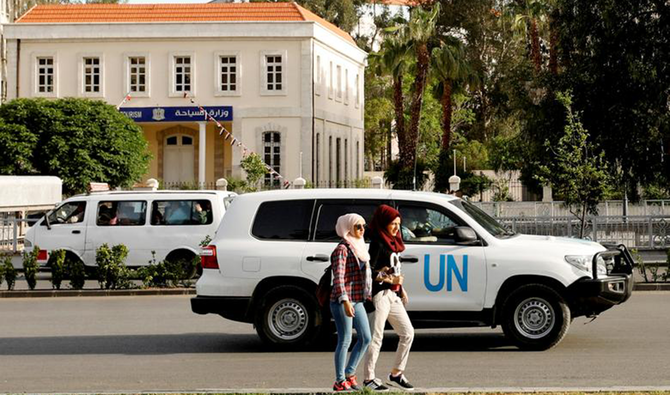
- Disarmament chief calls for unity among Security Council members so those who use such weapons are held accountable
- Despite Izumi Nakamitsu’s plea for ‘a bridge back to common sense,’ members continue to point fingers and blame each other
Canadian man shot dead in Egypt, says security source
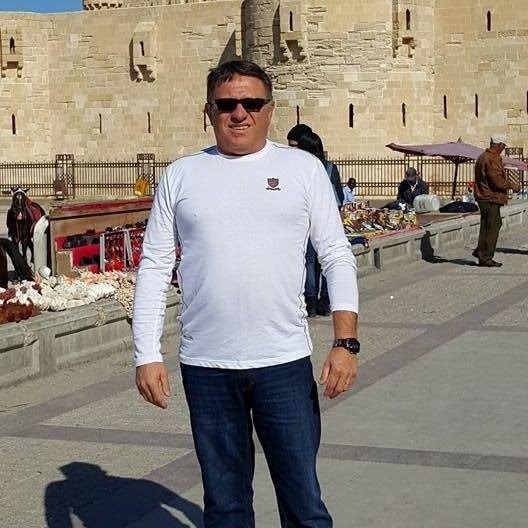
- Security sources made no link between the shooting and the dead man’s ethnic background
- A statement claiming the killing by a previously unknown group called “Liberation Vanguards” was circulating on social media
CAIRO: A Canadian man “of Jewish Israeli descent” has been shot dead during a robbery in the Egyptian city of Alexandria and authorities are investigating the incident as a criminal case, a security source said late on Tuesday.
The security source told Reuters the man had been killed “with the motive of robbery.” The source made no link between the shooting and the dead man’s ethnic background.
The interior ministry confirmed the shooting and said the man had been a permanent resident of Egypt. Neither the ministry nor the source gave any further details.
A statement claiming the killing by a previously unknown group called “Liberation Vanguards” was circulating on social media, but security sources said they had no information on the existence of such a group or whether it had been involved in the incident.
The shooting happened on Tuesday as Israeli forces seized the main border crossing between Gaza and Egypt in Rafah, where more than one million displaced Palestinians have sought shelter during Israel’s seven-month-old offensive.
One day after the war in Gaza began last October following an attack by Hamas militants on southern Israel, two Israeli tourists and their Egyptian guide were shot dead in Alexandria, in the first such attack on Israelis in Egypt in decades.
A policeman who said he had “lost control” was placed in custody regarding that incident.
Israel pounds Gaza as truce talks resume in Cairo
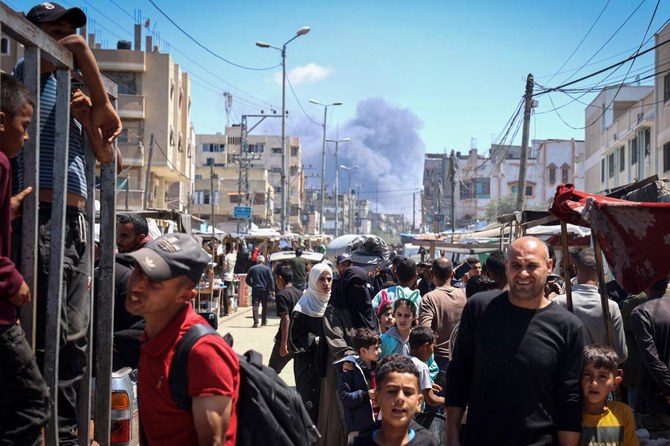
- AlQahera News: ‘Truce negotiations have resumed in Cairo today with all sides present’
- Moscow so far sees no prospect for a peace settlement in Gaza or the wider Middle East
RAFAH, Palestinian Territories: Israel bombarded the overcrowded Gaza city of Rafah, where it has launched a ground incursion, as talks resumed Wednesday in Cairo aimed at agreeing the terms of a truce in the seven-month war.
Despite international objections, Israel sent tanks into Rafah on Tuesday and seized the nearby crossing into Egypt that is the main conduit for aid into the besieged Palestinian territory.
The White House condemned the interruption to humanitarian deliveries, with a senior US official later revealing Washington had paused a shipment of bombs last week after Israel failed to address US concerns over its Rafah plans.
The Israeli military said hours later it was reopening another major aid crossing into Gaza, Kerem Shalom, as well as the Erez crossing.
But the UN agency for Palestinian refugees, UNRWA, said the Kerem Shalom crossing — which Israel shut after a rocket attack killed four soldiers on Sunday — remained closed.
It came after a night of heavy Israeli strikes and shelling across Gaza. AFPTV footage showed Palestinians scrambling in the dark to pull survivors, bloodied and caked in dust, out from under the rubble of a Rafah building.
Russia said on Wednesday that the war in Gaza was escalating due to Israel’s incursion into Rafah and that Moscow so far saw no prospect for a peace settlement in Gaza or the wider Middle East.
“An additional destabilizing factor, including for the entire region, was the launch of an Israeli military ground operation in Rafah,” Russian Foreign Ministry Spokeswoman Maria Zakharova told reporters.
“About one and a half million Palestinian civilians are concentrated there. In this regard, we demand strict compliance with the provisions of international humanitarian law.”
Speaking more broadly about efforts to find a lasting settlement in the Middle East, Zakharova said: “I would like to call it a settlement, but, alas, it is far from a settlement.”
“There are no prospects for resolving the situation in the Gaza Strip. On the contrary, the situation in the conflict zone is escalating daily.”
“We are living in Rafah in extreme fear and endless anxiety as the occupation army keeps firing artillery shells indiscriminately,” said Muhanad Ahmad Qishta, 29.
“Rafah is a witnessing a very large displacement, as places the Israeli army claims to be safe are also being bombed,” he said.
The Gaza war was sparked by Hamas’s unprecedented October 7 attack on Israel, which resulted in the deaths of more than 1,170 people, mostly civilians, according to an AFP tally of Israeli official figures.
Israel in response vowed to crush Hamas and launched a military offensive that has killed at least 34,789 people in Gaza, mostly women and children, according to the Hamas-run territory’s health ministry.
Militants also took around 250 people hostage, of whom Israel estimates 128 remain in Gaza, including 36 who are believed to be dead.
Talks aimed at agreeing a ceasefire resumed in Cairo on Wednesday “in the presence of all parties,” Egyptian media reported.
A senior Hamas official said the latest round of negotiations would be “decisive.”
“The resistance insists on the rightful demands of its people and will not give up any of our people’s rights,” he said on condition of anonymity because he was not authorized to speak publicly on the negotiations.
The official had previously warned it would be Israel’s “last chance” to free the scores of hostages still in militants’ hands.
Mediators have failed to broker a new truce since a week-long ceasefire in November saw 105 hostages freed, the Israelis among them in exchange for Palestinian prisoners held by Israel.
Mediator Qatar urges international community to prevent Rafah ‘genocide’
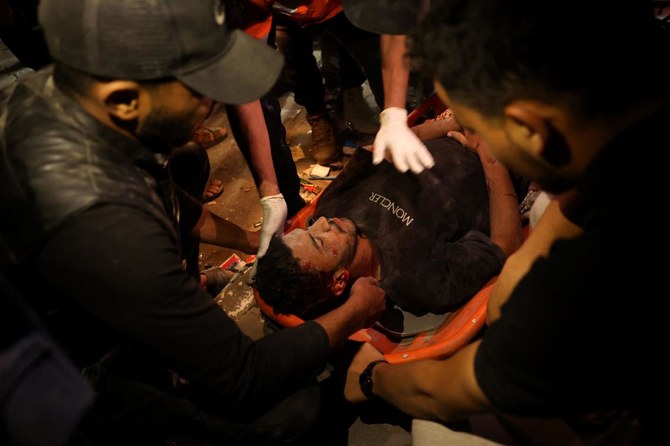
- Israel struck targets in the Gaza Strip on Wednesday after seizing the main border crossing with Egypt
- African Union condemns the Israeli military’s moves into southern Gaza’s Rafah
DOHA: Qatar called on the international community on Wednesday to prevent a “genocide” in Rafah following Israel’s seizure of the Gaza city’s crossing with Egypt and threats of a wider assault.
In a statement the Gulf state, which has been mediating between Israel and militant group Hamas, appealed “for urgent international action to prevent the city from being invaded and a crime of genocide being committed.”
Israel struck targets in the Gaza Strip on Wednesday after seizing the main border crossing with Egypt. Israel has vowed for weeks to launch a ground incursion into Rafah, despite a clamour of international objection.
The attacks on the southern city, which is packed with displaced civilians, came as negotiators and mediators met in Cairo to try to hammer out a hostage-release and truce deal in the seven-month war.
Qatar, which has hosted Hamas’s political office in Doha since 2012, has been engaged — along with Egypt and the United States — in months of behind-the-scenes mediation between Israel and the Palestinian group.
The African Union condemned Wednesday the Israeli military’s moves into southern Gaza’s Rafah, calling for the international community to stop “this deadly escalation” of the war.
AU Commission chief Moussa Faki Mahamat “firmly condemns the extension of this war to the Rafah crossing,” said a statement after Israeli tanks captured the key corridor for humanitarian aid into the besieged Palestinian territory.
Faki “expresses his extreme concern at the war undertaken by Israel in Gaza which results, at every moment, in massive deaths and systematic destruction of the conditions of human life,” the statement said.
“He calls on the entire international community to effectively coordinate collective action to stop this deadly escalation.”
Israel says it has reopened Kerem Shalom border crossing for Gaza aid
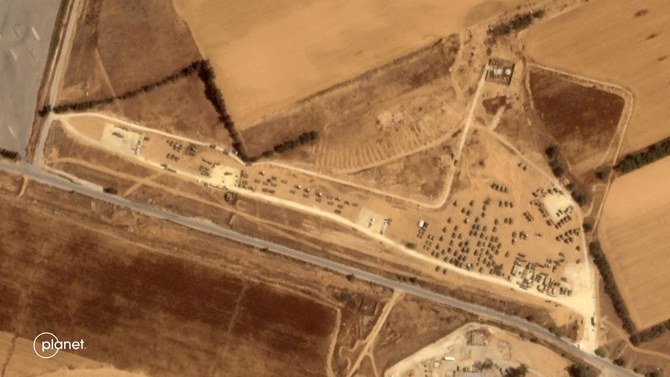
- Erez border crossing between Israel and northern Gaza is also open for aid deliveries into the Palestinian territory
JERUSALEM: Israel said it reopened the Kerem Shalom border crossing to humanitarian aid for Gaza Wednesday, four days after closing it in response to a rocket attack that killed four soldiers.
“Trucks from Egypt carrying humanitarian aid, including food, water, shelter equipment, medicine and medical equipment donated by the international community are already arriving at the crossing,” the army said in a joint statement with COGAT, the defense ministry body that oversees Palestinian civil affairs.
The supplies will be transferred to the Gaza side of the crossing after undergoing inspection, it added.
The statement said the Erez border crossing between Israel and northern Gaza is also open for aid deliveries into the Palestinian territory.
The Kerem Shalom crossing was closed after a Hamas rocket attack killed four soldiers and wounded more than a dozen on Sunday.
On Tuesday, Israeli troops seized control of the Palestinian side of the Rafah crossing between Gaza and Egypt after launching an incursion into the eastern sector of the city.
The United Nations and Israel’s staunchest ally the United States both condemned the closure of the two crossings which are a lifeline for civilians facing looming famine.
‘A blessing’: Rains refill Iraq’s drought-hit reservoirs
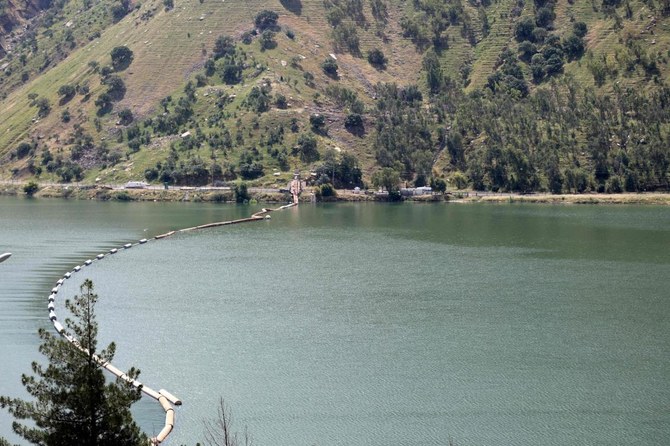
- The last time Darbandikhan was full was in 2019
- Iraq is considered by the United Nations to be one of the five countries most vulnerable to some impacts of climate change
Darbandikhan: The reservoir behind the massive Darbandikhan dam, tucked between the rolling mountains of northeastern Iraq, is almost full again after four successive years of drought and severe water shortages.
Iraqi officials say recent rainfall has refilled some of the water-scarce country’s main reservoirs, taking levels to a record since 2019.
“The dam’s storage capacity is three million cubic meters (106 million cubic feet). Today, with the available reserves, the dam is only missing 25 centimeters (10 inches) of water to be considered full,” Saman Ismail, director of the Darbandikhan facility, told AFP on Sunday.
Built on the River Sirwan, the dam is located south of the city of Sulaimaniyah in Iraq’s autonomous Kurdistan region.
“In the coming days, we will be able to say that it’s full,” said Ismail, with the water just a few meters below the road running along the edge of the basin.
The last time Darbandikhan was full was in 2019, and since then “we’ve only had years of drought and shortages,” said Ismail.
He cited “climate change in the region” as a reason, “but also dam construction beyond Kurdistan’s borders.”
The central government in Baghdad says upstream dams built in neighboring Iran and Turkiye have heavily reduced water flow in Iraq’s rivers, on top of rising temperatures and irregular rainfall.
This winter, however, bountiful rains have helped to ease shortages in Iraq, considered by the United Nations to be one of the five countries most vulnerable to some impacts of climate change.
In Iraq, rich in oil but where infrastructure is often run-down, torrential rains have also flooded the streets of Kurdistan’s regional capital Irbil.
Four hikers died last week in floods in Kurdistan, and in Diyala, a rural province in central Iraq, houses were destroyed.
Ali Radi Thamer, director of the dam authority at Iraq’s water resources ministry, said that most of the country’s six biggest dams have experienced a rise in water levels.
At the Mosul dam, the largest reservoir with a capacity of about 11 billion cubic meters, “the storage level is very good, we have benefitted from the rains and the floods,” said Thamer.
Last summer, he added, Iraq’s “water reserves... reached a historic low.”
“The reserves available today will have positive effects for all sectors,” Thamer said, including agriculture and treatment plants that produce potable water, as well as watering southern Iraq’s fabled marshes that have dried up in recent years.
He cautioned that while 2019 saw “a sharp increase in water reserves,” it was followed by “four successive dry seasons.”
Water has been a major issue in Iraq, a country of 43 million people that faces a serious environmental crisis from worsening climate change, with temperatures frequently hitting 50 degrees Celsius in summer.
“Sure, today we have rain and floods, water reserves that have relatively improved, but this does not mean the end of drought,” Thamer said.
About five kilometers (three miles) south of Darbandikhan, terraces near a small riverside tourist establishment are submerged in water.
But owner Aland Salah prefers to see the glass half full.
“The water of the Sirwan river is a blessing,” he told AFP.
“When the flow increases, the area grows in beauty.
“We have some damage, but we will keep working.”



